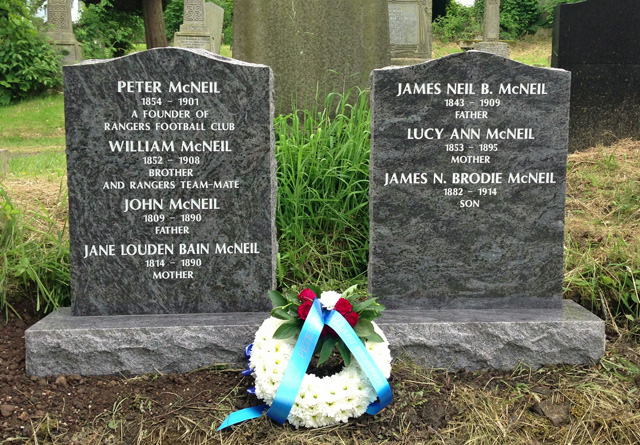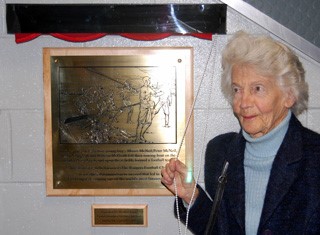119 Years Ago Today.
- Vallance
- Mar 30, 2020
- 3 min read
119 Years Ago Today.
On the 30 th March 1901 our Founder Peter McNeil passed at Hawkhead Asylum in Glasgow.
He rests in Craigton Cemetery with his brothers William and James and parents John and Jean.
On the 9th September 2009 Heather Lang unveiled a plaque at Fleshers Haugh to mark the location of the first match played by Rangers Football Club, against Callander, in May, 1872.
There was no-one more appropriate to carry out the ceremony than Heather, Granddaughter of Gallant Pioneer, Peter McNeil. Heather and her sister Doreen Holland were the strongest link we have with Peter and his fellow Pioneers; his brother Moses, Peter Campbell and William McBeath.
Sadly Heather passed at her sister’s home in London in 2016.
Heather and Doreen, though, were unaware of their link with the founding of Rangers. Grandfather Peter had a tragic end to his life. It was probably because of this, that their mother, Gertrude, daughter of Peter and his wife, Janet, never spoke of her father. He had died in Hawkhead Asylum, on 30 March, 1901. He had clearly suffered from a form of mental illness, though his death was recorded as “general paralysis’’.
Peter was born in 1854, a year before his brother and fellow Pioneer, Moses. In his mid- teens, he had moved to Glasgow with other members of his family. Peter played in the first match against Callander, in May, 1872. He was one of the Club’s earliest captains and was a regular in the side until 1876. It was off the field of play though Peter McNeil made his greatest contribution to the formative years of the Club.
William Dunlop tells of Peter heading to Fleshers Haugh about noon to secure the field for the Club. The goalposts would be planted and he would then have to watch over the field until the “appointed hour”.
When his playing days were over, and he gave way to better players, he became honorary secretary. He held this position from 1876 – 1883. He was vice-president from 1886 – 1888. He was a greatly respected administrator, serving as treasurer of the Scottish Football Association from 1879 – 1883. He was known as “Genial Peter”, a much-loved and respected figure within Scottish Football.
Peter had a business which he ran with his brother, Harry, “H and P McNeil”. It was one of the forerunners of the modern sports outfitters. The business had started in the mid 1870’s. The original premises had been in Renfield Street but in 1883, the brothers moved to Union Street. They were suppliers of outfits to both Rangers and Scotland. In March, 1885, Peter married Janet. Rangers Football Club presented the happy couple with “a beautiful inlaid marble clock and a pair of equestrian bronzes”. Within five years, the family was complete with the birth of John Fraser and Gertrude Grace. Despite the happy home life, it was clear the pressure of business was taking its toll of Peter. His brother Harry was a partner in the business . Harry McNeil had been one of the most famous and popular footballers of his day. He played for Queen’s Park and had been an established Scottish internationalist. For many years after he retired from playing, his name was frequently recorded in the sports media of the day. The business of H & P McNeil disappeared from the PO Directory by 1896. Bankruptcy had come to Peter and Harry.
The deterioration of Peter's mental health caused anguish to his family. In January, 1901, he was committed to Hawkhead Asylum.
Peter McNeil lay at rest for many years with his parents, John and Jean, and older brother William in what was an unmarked grave at Craigton Cemetery. Either side of him are his brothers Alexander and James.
On the 22nd June 2013 memorials to our Founder Peter McNeil and his family were erected on their final resting places at Craigton Cemetery.
Peter’s resting place fittingly looks on to the front door of Ibrox Stadium.
Our Founder Peter McNeil died at a young age ,he was only 47, but he lived long enough to see the Club that he helped form and nurture grow from what was essentially a boys club on Fleshers Haugh into a worldwide sporting institution.
Today we remember Peter McNeil.













Comments